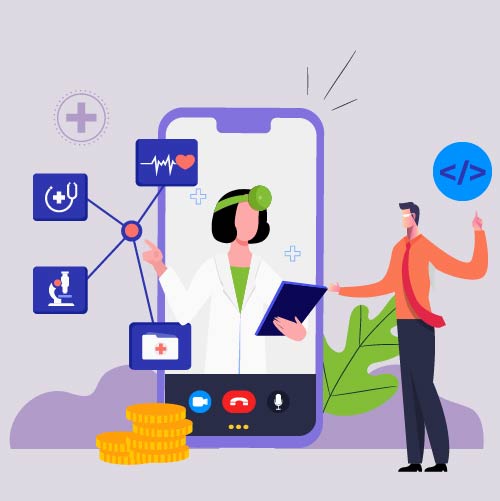- Types of Healthcare Apps
- Healthcare App Development Features
- 1. Health Tracking
- 2. Appointments
- 3. Scheduling and Reminders
- 4. Patient Information Database
- 5. Geolocation
- 6. Real-time Chats
- 7. Payment Gateway
- 8. Ratings and Reviews
- 9. Cloud Integration
- 10. Reporting and Analytics
- Challenges Prevalent In the mHealth Sector
- 1. Compliance & regulations issues
- 2. Presence of multiple devices
- 3. Lack of security
Everything from hospital waiting time management to EHR optimization is becoming efficient with digital healthcare solutions. But digitalisation has its own challenges too.
The speed at which the healthcare sector is transforming is remarkable. The time when people had to wait for days to get doctor’s appointments for even routine checkups has been replaced by real-time video chats.
While there’s a considerable amount of positive changes on the patients’ side of the story, the doctors’ and hospital admin side has a similar view to share about healthcare digitalization. Everything from hospital waiting time management to EHR optimization becomes efficient with digital healthcare solutions.
There are a number of factors that have contributed to bringing healthcare systems from their traditional structure to their current digitalized scenario. But if we had to list down the most impactful ones they’d be – healthcare app development features and the challenges which are making the sector accessible.
In this article, we will be looking into both factors in detail.
Before we dive into the many healthcare mobile app features that make the sector better and the challenges in healthcare application development that make it robust, it is important to understand the healthcare ecosystem through the view of the types of healthcare apps.
Types of Healthcare Apps
Healthcare apps are generally categorized on the basis of patients and healthcare institutions’ stakeholders – care providers, doctors, and healthcare institutions.
Let us look into the healthcare app ideas that fall under both categories.
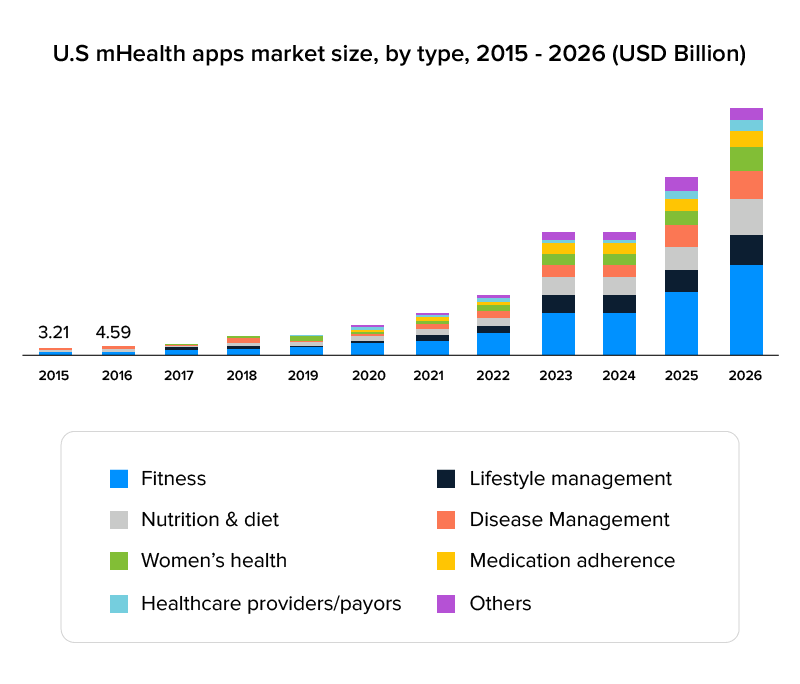
Apps for Healthcare Providers
- Patient monitoring apps
- Reference and database apps
- Appointment and clinical assistance apps
- EHR solutions
Apps for Patients
- Education and self-diagnosis apps
- Health monitoring apps
- Mental wellness apps
- Nutrition apps
- Women health apps
- Reminder apps
What is exciting about the present healthcare landscape is that this list will not remain the same after a few years, in fact noting the speed at which things are moving, it won’t be the same after a few months.
But sitting at today, these are more or less the apps that are the most popular ones.
Now what makes them popular is the feature-set they come powered with. Although no two healthcare apps have the same set of features, there are some functionalities that are the same across a range of different mHealth apps, making them the must-have features.
Healthcare App Development Features
1. Health Tracking
It is one of the most crucial features for a patient and doctor-facing app. The functionality enables monitoring of patients’ vital signs and health conditions like blood pressure, pulse rate, calorie intake, blood sugar level, calories intake, etc.
2. Appointments
The functionality is a must-have element for healthcare apps for patients. It allows them to request an appointment with their doctors while giving doctors a holistic view of the appointments they have to attend in a day. One of the key benefits of mobile health apps in this category is that they eliminate the waiting room scheduling chaos. There are apps like Zocdoc which work solely around this feature set.
3. Scheduling and Reminders
The feature helps patients schedule medicine intake, track sleep, drink water, or simply be reminded of their daily calorie intake, etc. It makes it easy for patients to keep a better track of their health goals.
4. Patient Information Database
This healthcare app feature is majorly used by doctors and healthcare organizations. Under this functionality, the caregiver side of stakeholders gets real-time access to the patients’ medical history, reports, prescriptions, etc.
5. Geolocation
This feature is more on the emergency side of the healthcare system. Patients can use the app’s in-built map integration to find out doctors and hospitals near them when they are not near their primary location.
6. Real-time Chats
This functionality is the most recent one to become a must-have healthcare app feature. In the COVID-19 era, the criticality of remote medical assistance came to the surface. People raised the need to connect with their doctors when they were limited to their homes. The need led to making real-time text, voice, and video chats a necessity.
7. Payment Gateway
Integration of mobile payments with hottest payment features like net banking, wallets, and debit/credit cards enables patients to conveniently pay for insurance and treatment. The integration also supports bill copies and documentation access.
8. Ratings and Reviews
At a time where there are a number of doctors and hospitals operating across every city, it becomes very difficult for patients to judge the efficiency and whom to trust their health with. To solve this issue, the healthcare app development system generally adds ratings and reviews to the list of features.
9. Cloud Integration
Cloud integration is more than a feature for the healthcare domain. It’s a necessity. It is extremely important for healthcare providers to keep the patient data in a secure cloud infrastructure. The essentiality of keeping data secure is also a big reason behind the healthcare sector exploring blockchain technology and its decentralization capabilities.
10. Reporting and Analytics
The last in our list of must-have healthcare app features is analytics and reporting. Every healthcare mobile app development company aims for creating a dashboard for the stakeholders wherein they can track their health, patient count, finances, and other crucial sector and health impacting factors.
These features have emerged as a result of the healthcare mobile apps trends and the many mHealth app challenges that the sector faces. But even after reaching new heights in the digitalization landscape, there are some challenges that remain in the sector. You might also want to check the Top 10 eCommerce app features for startups and enterprises
Related Article: How much does it cost to build a healthcare app like Patient Access?
Challenges Prevalent In the mHealth Sector
1. Compliance & regulations issues
One of the biggest mHealth app challenges is following compliances. Every major nation comes with its own set of regulations that a mhealth app should follow.
The USA – If you are launching an app for the US region, you will have to comply with the HIPAA and PHI regulations. In addition to these, you should also concentrate on the CCPA, NIST, and GDPR rules.
Canada – mHealth apps made for the Canadian region have to follow PIPEDA guidelines.
The United Kingdom – The healthcare app developers of the region should follow the guidelines mentioned in the NSCS website to the t.
European Union – For healthcare apps working in the EU location, it is important that the GDPR rules are met.
For an entrepreneur or healthcare organization looking to make a global launch of their mHealth app, it becomes a challenge to follow all the different compliances and rules. This is where a healthcare IT consulting firm like ours comes into the picture. We have developed and deployed over 70+ health apps to give a fair idea of how to design apps that can get live on a mass scale.
2. Presence of multiple devices
With a number of new channels and devices entering the healthcare space – Smart TVs, Smartphones, Voice-powered devices, etc. interoperability continues to be a big problem for the sector. Noting the growth in the number of active devices that patients and doctors interact with it has become very difficult and yet crucial to ensure complete security across platforms.
Reasons like these back entrepreneurs’ unsurity in terms of whether to enter the space.
3. Lack of security
There are millions of horror stories around patients’ data getting hacked or getting misplaced because of un-secure storage infrastructure. Although in books, security is one of the first things that every healthcare organization should consider, in reality, there are only a few apps that take the task seriously.
The compliance that we talked about in the first point solves the issue to some extent but it all boils down to the individual steps that a brand takes to have a security-first model.
These healthcare app development challenges together have been keeping the sector from reaching the state of complete digitalization. However, industry stakeholders are taking a number of measures to solve the issues.
Now that you have looked into both the factors that contribute to defining the healthcare landscape and the healthcare app market size, the next plan of action should be to partner with a telemedicine app development agency that can help you build next-gen healthcare app development services. Services that would act as an example for the industry as to how to solve the crippling issues of the sector.


- In just 2 mins you will get a response
- Your idea is 100% protected by our Non Disclosure Agreement.
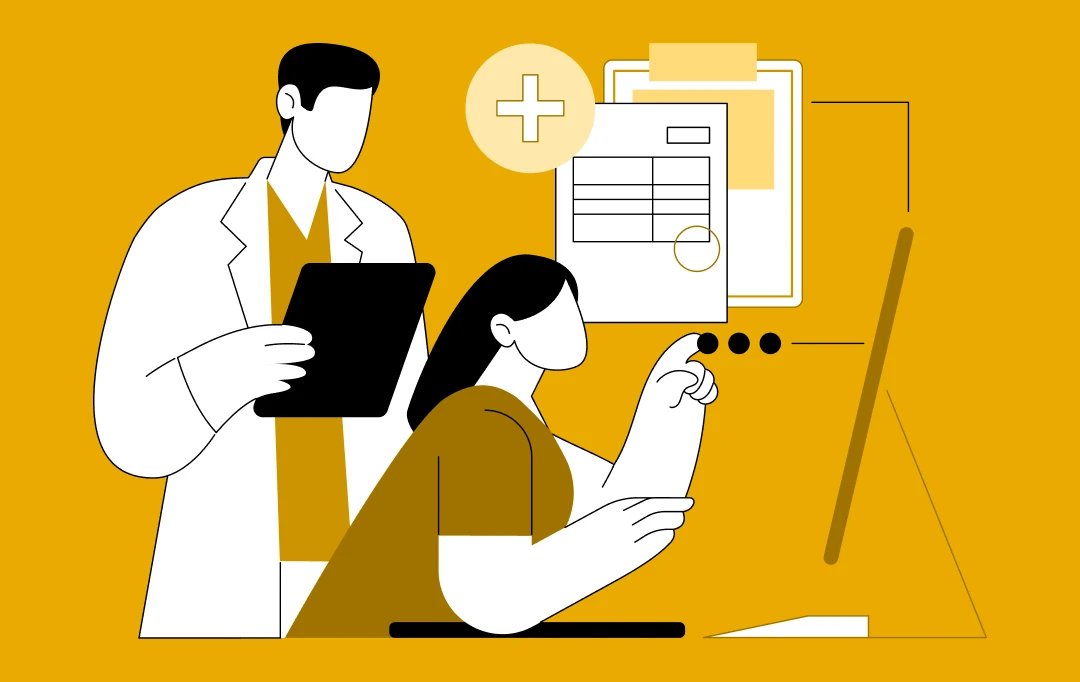
Healthcare IT Outsourcing: Key Benefits, Best Practices, and Implementation Process
Key Takeaways Reduce Costs by 30-40%: Convert capital IT expenses to predictable operational costs, eliminating the need for large in-house teams and infrastructure. Focus on Core Patient Care: Free up internal resources from IT management to concentrate on core healthcare services, innovation, and growth. Ensure Compliance & Mitigate Risk: Leverage expert partners to navigate HIPAA…
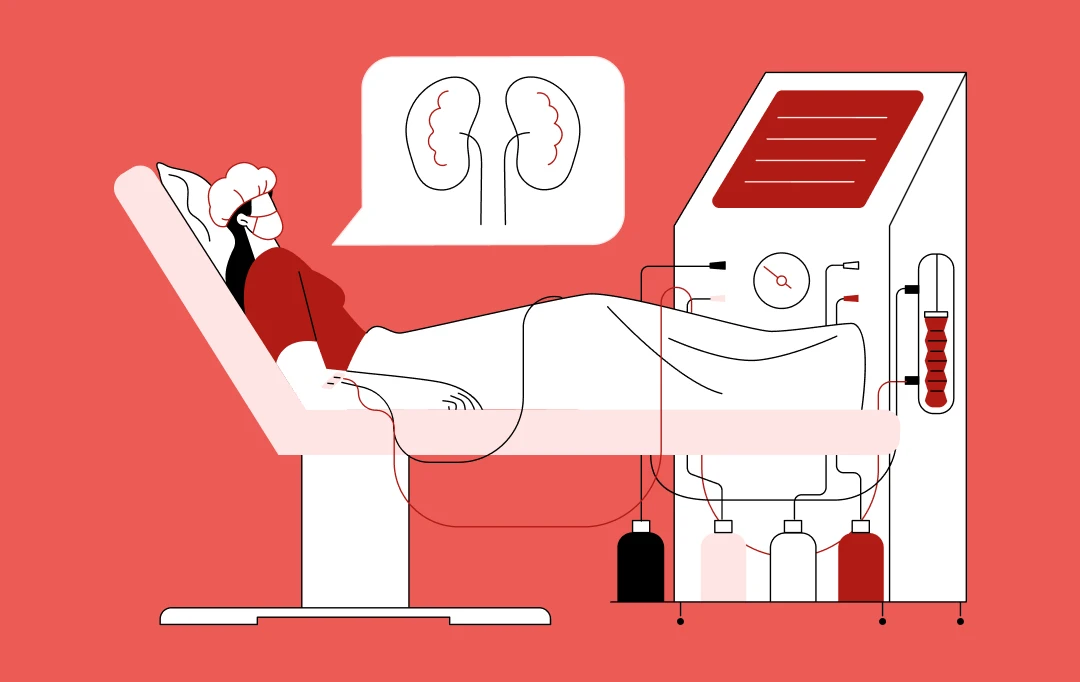
How AI-Powered Virtual Health Assistants Are Enhancing Remote Patient Monitoring
Key takeaways: Remote patient monitoring has the potential to reduce hospital readmissions by up to a quarter, shifting healthcare from reactive to proactive care through continuous, real-time health tracking. The U.S. health intelligent virtual assistant market is expected to reach $1.87 billion by 2030, driven by the growing demand for continuous care, virtual consultations, and…
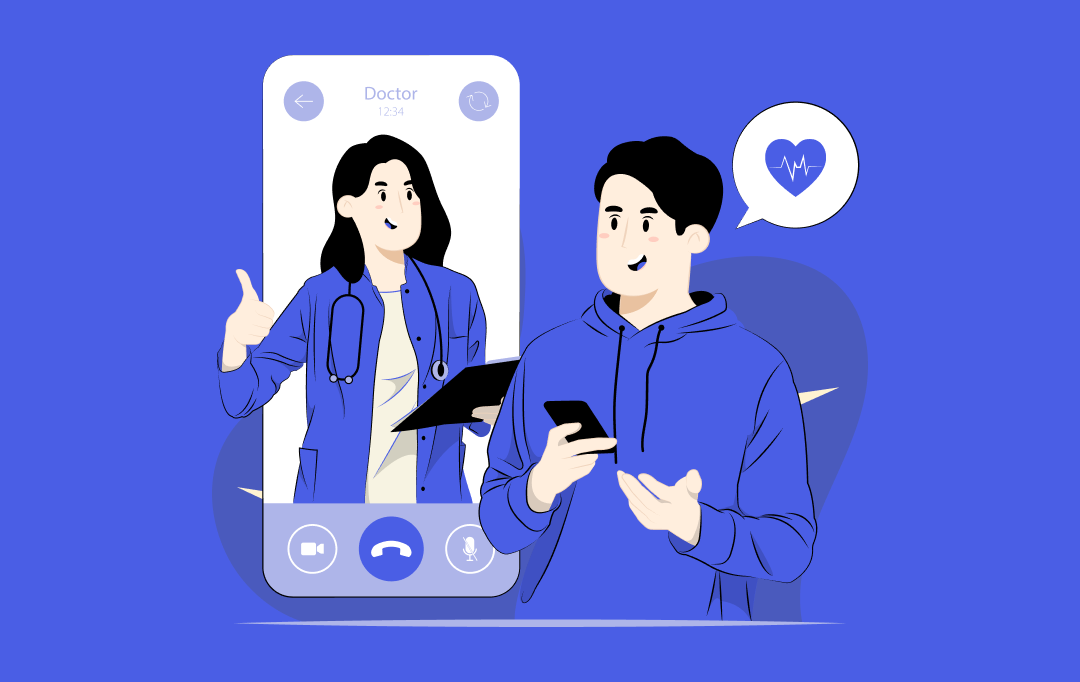
Why Telehealth Security is Non-Negotiable for Patient Trust and How to Achieve It
Key takeaways: Telehealth security is crucial for patient trust and the continued adoption of digital healthcare services. The rising tide of cyber threats, from ransomware to inadequate authentication, poses significant risks to patient data and provider reputation. Implementing robust security measures like end-to-end encryption, multi-factor authentication, and regular audits is non-negotiable. Compliance with regulations like…






